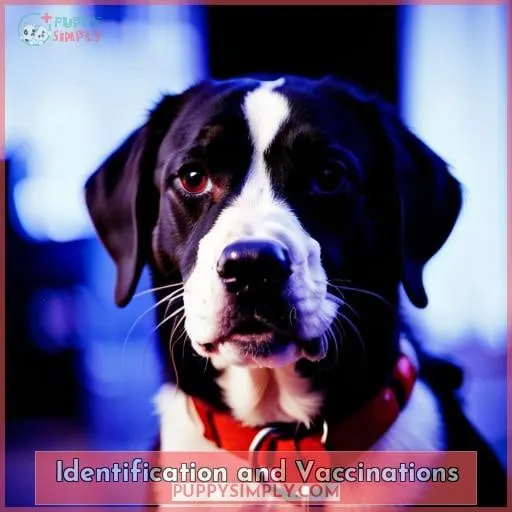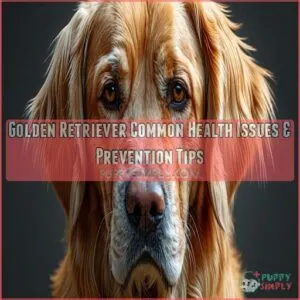This site is supported by our readers. We may earn a commission, at no cost to you, if you purchase through links.
Have you ever felt like your canine companion was an extra limb? It’s not surprising; dogs have been our faithful companions since time immemorial. To ensure that these pups remain healthy and happy, it is important to understand their needs when it comes to diet, exercise, identification and vaccinations, grooming and hygiene, as well as healthcare treatment.
Table Of Contents
Key Takeaways

- Understanding dogs’ needs in diet, exercise, identification, vaccinations, grooming, and healthcare is crucial for their health and happiness.
- Signs of nutritional imbalances or deficiencies include a dull coat, weight gain or loss, and skin irritations.
- Dogs need plenty of exercise for improved cardiovascular health, stronger bones, balanced hormones, and mental stimulation.
- Regular check-ups, tests, and monitoring for signs of distress are important for a dog’s healthcare and treatment.
Diet and Nutrition
It’s important for you to ensure that your pup is getting the right nutrition in their diet. Feeding habits should be adjusted as your dog grows and changes, while food types can range from commercial kibble to home-cooked meals.
When selecting a food type, consider nutrient sources such as meat proteins and carbohydrates like grains or potatoes. You want a dietary balance of fats, vitamins, minerals, and other nutrients – supplements may also be needed if they are not found naturally in the chosen diet plan.
Variation is key when it comes to providing adequate nutrition! It helps keep them interested so they don’t get bored with the same meal every day; provide plenty of fresh water too!
Look for signs that something isn’t quite right – dull coat? Weight gain or loss? Skin irritations? These could all be indicators of nutritional imbalances or deficiencies which need attention immediately.
Take charge by researching quality diets specifically designed for dogs’ needs – this will help ensure your furry friend stays healthy throughout their life!
Exercise and Activity
You need to make sure your pup gets plenty of exercise and activity so they can stay healthy and happy! Tail-wagging benefits like improved cardiovascular health, stronger bones, and more balanced hormones are just some of the rewards.
Muscle-building activities, such as swimming or agility training, also help keep them physically fit.
Playtime is important too. It stimulates their mind while providing an outlet for excess energy.
Additionally, research has shown that regular physical activity helps reduce stress levels in dogs, which can lead to better behavior overall! Exercise provides many mental benefits as well, including increased confidence and self-esteem, in addition to strengthening bonds between you both.
So be sure not to give your pup frequent opportunities for playtime fun – it’s essential for their well-being inside out!
Identification and Vaccinations
Identifying and vaccinating your canine companion is a vital step in safeguarding their well-being, allowing them to live the fullest life possible. Vaccinations are essential for protecting against diseases, so it’s important for pet owners to understand what types of vaccines are available and when they should be administered.
Here’s an overview:
- Vaccine Types: Depending on where you live, there may be different options available such as DHPP (for distemper virus), rabies vaccine (mandatory in most areas), or leptospirosis vaccine.
- Vaccination Schedules: Depending on age and lifestyle factors like indoor/outdoor access, puppies need a series of vaccinations over time while adult dogs may only require booster shots annually or every few years depending on risk factors based upon breed & environment.
- Tag Placement: Proper identification tags with contact information will help ensure if your pup ever gets lost that they can make it home safely! Additionally, many cities require microchipping as part of registration requirements which further increases chances of recovery should Fido go missing.
From breeder requirements to pet insurance coverage, understanding these vaccination basics helps keep furry family members safe from preventable illnesses while providing peace-of-mind for responsible pet guardians who want nothing more than health & happiness all around!
Grooming and Hygiene
Regularly grooming your canine companion is important for their overall hygiene and well-being.
Brushing teeth should also become part of the routine; this helps reduce plaque buildup, which may lead to additional health concerns down the line.
Additionally, cleaning ears on a regular basis is imperative as it prevents infection or wax buildup, leading to irritation or pain.
Finally, shampooing every couple of months aids in maintaining skin health and coat luster so Fido always looks his very best (and smells great too!).
Health Care and Treatment
Taking proactive steps to ensure your furry friend’s healthcare and treatment is essential for providing them with the best possible quality of life. Diagnosis strategies should be employed to identify any potential issues early, so that proper preventive measures can be taken.
This may involve routine check-ups or tests from a veterinarian, as well as regular monitoring for signs of distress – such as changes in appetite or energy levels, unusual behavior, etc.
In addition, it’s important to know what emergency care options are available at all times, should an unforeseen incident arise requiring immediate attention.
Frequently Asked Questions (FAQs)
What type of food is best for my dog?
The best food for your dog depends on their age, size, activity level, and any specific health needs.
How often should my dog be exercised?
Exercising your dog regularly is important for their health and happiness. Aim to give them at least 30 minutes of vigorous activity each day, such as running or playing fetch, so they can stay fit and active.
What vaccinations does my dog need?
Vaccinations are crucial for your dog’s health. Your veterinarian can recommend a schedule based on age, lifestyle, and risk factors to ensure they stay protected from infectious diseases.
What are the best grooming techniques for my dog?
Groom your dog regularly to keep their coat healthy and shiny. Use a brush, comb, and shampoo designed specifically for dogs. Trim nails with clippers or grinders gently to avoid injury, then use wipes or cotton balls moistened with warm water to clean the ears of dirt and debris.
What medical treatments are available for my dog?
You have a variety of medical treatments available for your beloved pet. From preventive care and vaccinations to surgery, diagnostics, and emergency services – there is something to keep them healthy and happy.
Conclusion
Caring for your dog’s health is a rewarding experience. It’s important to remember that a healthy diet and regular exercise are essential to your dog’s well-being. Take the time to get your dog vaccinated and groomed to keep them looking and feeling their best.
Finally, don’t forget about regular check-ups with your vet, as prevention is always better than cure. All of these measures are a small but important part of ensuring your dog has a long and happy life.
It’s a commitment that will pay off in terms of the joy and companionship your dog will bring you over the years.
By investing in your pup’s health, you’ll reap the rewards for years to come.











